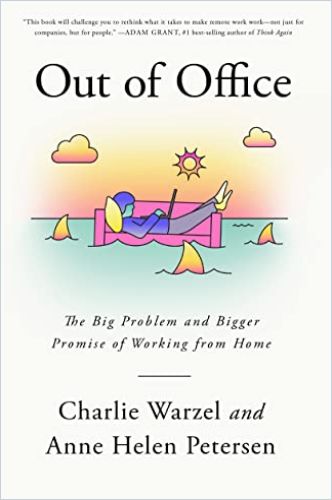America needs a new work culture. Remote work can help chart a return to balance, well-being and community.

Stop Fetishizing Work
Journalists Charlie Warzel and Anne Helen Petersen offer a piercing indictment of American workplace culture and issue a clarion call for employers and workers alike: Use the opportunity presented by the remote work revolution to make sweeping changes. They believe truly flexible work can be part of the solution to an overstressed, overworked society. But remote work alone won’t cut it. Americans must stop fetishizing work itself and learn to enjoy other parts of their lives.
Scrap the “Always On” Mind-Set
Warzel and Petersen applaud the fact that more than 40% of Americans worked from home during the COVID-19 pandemic. They believe these arrangements will continue because employers have seen the advantages, including lower office costs and equal or better productivity. But they insist that working from home should benefit workers, too. They argue that work must undergo fundamental change, including reduced work hours and more stability.
The thesis of this book is that remote work – not remote work during a pandemic, not remote work under duress – can change your life.Warzel and Petersen
The authors implore workers to grab the opportunity presented by the pandemic to reset work. Executed properly, remote work can give people more time to live their lives and increase their well-being by granting them time to make connections with others and build back their communities.
First, though, workers must change their “always on” mind-set – a sickness that many employees subscribe to along with their employers. Americans should shift from living to work to working to live.
Condense the Work Week
Ironically, say the authors, American workers suffer from both too little work and too long hours, even as useless work abounds in most firms. Knowledge workers, they estimate, could do the important and necessary parts of their jobs in a few hours each day. They cite research that finds significant productivity increases and improvements in business outcomes among firms that experiment with four-day work weeks (without salary cuts). Condensing the work week encourages prioritization – workers spend more time on what matters but less time at work overall.
Set Up Guardrails
Warzel and Petersen point out that most people don’t know how to work from home successfully, just as most leaders don’t know how to manage remote workers effectively. They advise firms to teach these skills.
We live to work because there’s so little else in our lives; there’s so little else in our lives because we live to work.Warzel and Petersen
Allowing people to work where and when they want sounds good, say the authors, but if leaders work from the office every day, they signal their preference, discouraging those who work from home. Managers, the authors advise, must set rules and structures that support remote and hybrid work. They should offer no advantages to employees who choose to work from the office.
Fix Toxic Cultures
Despite inspiring mission statements, the day-to-day reality of long hours, little support for family obligations, and other disagreeable elements of work reveal the true office culture, say Warzel and Petersen. In return for a paycheck, firms expect employees to work hard and toe the line. This kind of culture might have offered some mutual benefit in the 1950s and ’60s, say the authors, but by the ’80s, mass layoffs, restructurings and a laser focus on just one class of stakeholder – investors – destroyed the balance.
Employees are expected to become infinitely mutable while employers become increasingly rigid.tech employment scholar Carrie M. Lane
Genuinely flexible work, say Warzel and Petersen, can correct bad cultures. But leaders and employees must throw out their organizations’ pre-pandemic mind-sets and aim to establish new norms that embrace real flexibility, less work, more diversity and inclusion, and less fetishism of productivity and efficiency. Employees already produce enough, claim the authors.
Don’t Monitor Employees Excessively
Warzel and Petersen have found that many workplace technologies deliver what they promise: efficiency and time savings. Sadly, though, leaders direct those time savings toward one thing: getting more from employees for the same pay. The authors point to collaboration software like Teams and Slack that make downtime visible and only attract more work, more meetings and more emails or messages.
We must begin to see productivity and efficiency as a means to an actual end, not a means to more work.Warzel and Petersen
Technologies that monitor on-site and remote worker productivity abound, warn the authors. Almost one-third of US firms use them. Perversely, according to Warzel and Petersen, vendors and some employers claim that the tools free employees from manager oversight by capturing web pages visited, emails sent, keystrokes and even time spent on bathroom breaks. This absurdity only denies the indignities of monitoring tools and hastens the erosion of trust.
Rehabilitate Communitarianism
Channeling Robert Putnam in Bowling Alone, the authors recall the collectivist leanings of Americans only a few generations ago when most people joined clubs, attended church and supported their communities. Today, they say, overworked and under-supported employees have little time left over for community, which has left workers feeling more isolated and lonely.
Our reliance on individualism has left us where it was always going to leave us: incredibly alone.Warzel and Petersen
If handled poorly, they warn, remote and hybrid work could heighten isolation. Fewer public transit riders, for example, will lead to lower revenues and less investment, starving those systems. A vicious cycle might ensue as a reduced tax base leads to cuts in services.
The modern cult of individualism, say the authors, has left parents on their own to manage child care – a situation starkly revealed during the pandemic. American society fails to see the obvious they argue: Everyone – including people who don’t have children of their own – shares in the responsibility to raise and educate the next generation.
Use Remote Work for Good
Warzel and Petersen collaborated early on in the COVID-19 pandemic. They are surely pleased to see so many Americans reclaiming their lives, demanding more flexibility, and tolerating less abuse and toxicity at work – at least for now.
Charlie Warzel writes the “Galaxy Brain” newsletter for The Atlantic, where he is a contributing writer. Anne Helen Petersen writes “Culture Study” on Substack and is the author of four books. Both are former senior journalists for BuzzFeed News.






